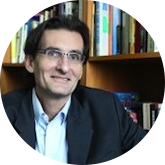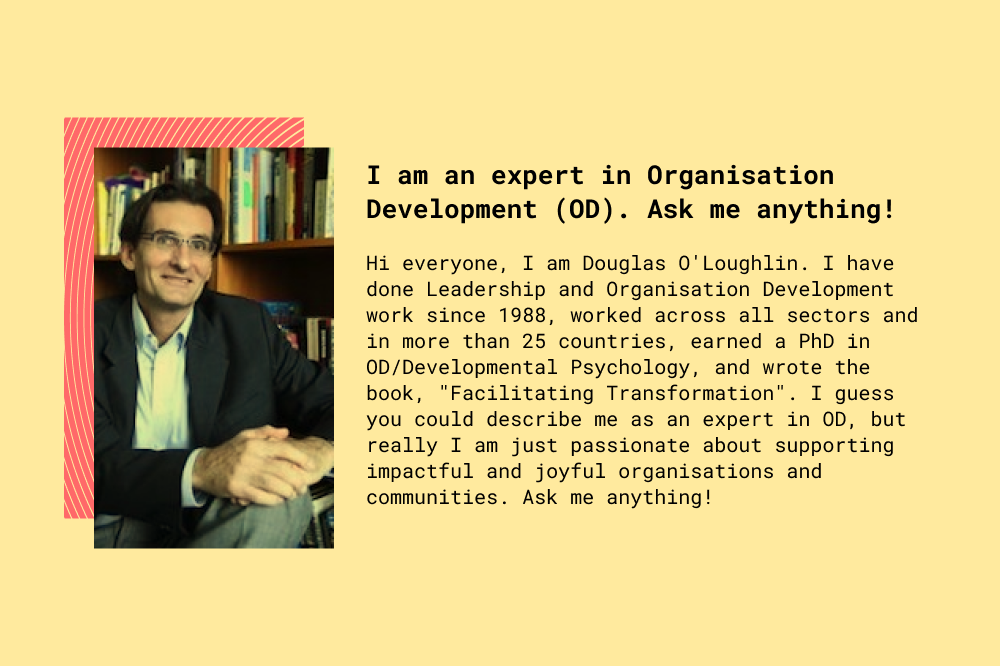I am an Organisation Development Expert, Ask me Anything
If you could ask an expert in Organisation Development (OD) any question you want, what would you like to know?
At Studio Dojo, we are very fortunate to have friends like Dr Douglas O’Loughlin we can work with and be able to tap on his years of experience in the fields of Organisation Development and Leadership Development.
Being a studio that works in the intersection of different disciplines, this got us thinking, what would our friends from other professions like design, futures thinking, education and more, be curious about if they could ask an OD expert anything they want?
So we experimented with a little “IamA” post, a sort of interactive interview where we collected questions from the communities we are part of, then sent them to Dr Douglas to respond to.
Here we have collated the questions we collected over a couple weeks, as well as Dr Douglas’ response to each. We hope you find them as interesting and informative as we have!

About the Expert
Hi everyone, I am Douglas O’Loughlin. I have done Leadership and Organisation Development work since 1988, worked across all sectors and in more than 25 countries, earned a PhD in OD/Developmental Psychology, and wrote the book, “Facilitating Transformation“. I guess you could describe me as an expert in OD, but really I am just passionate about supporting impactful and joyful organisations and communities. Ask me anything!
What is Organisation Development?
Organisation Development (OD) is a set of principles and practices that work with groups of people as a system, whether a team, organisation, classroom, or community, to make it healthier and have more impact. The ideal for any group is that their mission is served, people have a great experience together, and each individual is better off for being part of the group. OD looks at the health of an entire system, which includes the people and other possible factors such as processes, structures, leadership and culture.
When practicing the art of organisation development, the system builds its own capacity and capability for the future, to achieve its goal.
How would you explain OD to a 5-year-old?
Organisation development is for families, friends, and classes to all get along, learn together, and find out how we are doing with each other, so each person can be happy.
Is OD relevant only to big organisations? Or are they also applicable to small teams?
OD is relevant to organisations of all sizes, and even to families and relationships.
There was once, a couple I met in an OD Masters programme I conducted asked me to speak at their wedding. I took some OD principles and applied them to relationships. For example, what are your aspirations for each of you and as a couple? How can you understand each other and your dynamics? How do you handle conflict as a couple? What offers and requests do you have for each other so that you can each fulfill your individual dreams?
Why should designers know more about OD and how is it relevant/add value to their work?
There are a few reasons OD could be relevant. Designers want their work to have impact, so having a better understanding of organisation dynamics can be very helpful.
This could include: how to contract upfront with the client to make sure they understand what they need to do to make a project successful; understanding change management so that design work is implemented in an optimal way; and helping the organisation build a culture where design is a factor in everything they do.
What are some success stories of OD being used by designers?
One is the Innovation Lab in the Public Service, a team that has gained global recognition for the work they do. Alexander Lau and his team attend many OD programmes and it has helped them see the larger systems at play and have more impact across the public service and society.
Where should I start if I want to learn about OD? Are there fundamental principles or concepts I should read first?
A good place to start for resources is a site set up by Ricky Foo, who is part of the OD Network in Singapore. This site has lots of good articles, references to books, some excellent videos, and communities you can join: https://sites.google.com/view/odnskmportal/home
There is also a full suite of OD programmes offered in the public service. Recently, there are more OD programmes outside the public service too, such as those from Studio Dojo and The Thought Collective.
Is it possible to test or measure the effectiveness of learning and applying OD at work?
The answer is yes, with a caveat that it is not always easy to measure systemic impact. The important thing to remember about measuring effectiveness is that it comes at the beginning of a project, not the end. What I mean by that is that the agreement on how to measure the effectiveness of a project should be done even before the project starts. It could be as simple as doing after-action-reviews, or as complex as attempting to assess impact the work has had on the organisation. Again, all agreed on before the project starts.
Of all the possibilities in the world of work, how is it you landed in OD?
My 1st career was in IT (AT&T) most of my free time was spent coaching sports and doing community work. I used to hope that I could do what I love as a job and not just a hobby, and through a series of miracles I ended up in an OD role in AT&T, facilitating a global culture change programme called Project Miracles (and that is how I started coming to Asia). Btw, most of the people I know in OD have their own unique stories.
How would you ascertain if a person is a good fit for a role in OD?
I would say a passion for supporting whole systems to be effective and healthy, and a reasonable amount of self-awareness, IQ, and EQ. One more is that if we went to where a person is currently working, we would find they are well-respected and trusted by their colleagues at all levels.
Do you have a favourite OD model/framework? And why?
There are 3 ways of thinking/acting that come to mind: 1. Action Research, which is the dynamic process of how to do OD work, 2. Levels of the System, as it helps us sensemake from the intrapersonal level all the way up to society, and 3. Use of Self, which keeps us in meaningful development as individuals, so we can better serve those we partner with. To answer your question directly, Burke-Litwin is an “org model” I appreciate , as it can be used to teach about org fitness and alignment, as well as a framework for change.
Which has been the most joyful and impactful organisation(s) that you have come across? Why?
Over 30+ years, I have been fortunate enough to have a few of such projects, where a client system just needs a nudge to do great things. One is from a few years ago, there was a complex project in the public service, where 9 agencies came together to support the families in SG who were going through difficult times. It was joy to work through the coordination challenges and to see the impact it had in society.
What is your fondest and most painful memory in your years of working in this field?
So many memories to choose from. I once worked with an office which went from rank 23rd out of 23 to number 2 in less than a year, that was such a joy to see.
I have supported many leadership teams that were struggling, and with some effort, became high-performing, benefitting them individually, as a team, and the organisation.
I often find that a group of people has either enough pain or aspiration that it just takes a nudge from a facilitative consultant for amazing things to happen.
The most painful memory was one where I didn’t contract properly with the CEO of a large company here in Singapore. It was an intense project that lasted about 6 months. There was little impact because I didn’t get the CEO’s agreement on one or two important aspects.
It was my fault for not bringing up the issues, as I felt intimidated by his position and big office. I was so disappointed in myself that I injured my back shortly after the project was over and I ended up in the hospital, which I think was related. The good news is that I learned to make good agreements with all the senior leaders I have worked with since then.
The ‘health’ of an organisation is understood differently by different organisations. How do OD principles and practices balance that when working with different organisations?
In OD work, we often don’t use the term ‘Organisation Development’, as we focus on the food not the menu. So the issues and aspirations of the organisation take front and centre, and we use our processes, tools, and frameworks to help them get to where they want to be. Each sector and organisation is somewhat unique and it is important to keep that in mind.
How do we design change management such that it motivates and allows everyone to see they can collectively contribute to a shared goal?
Change management implies that a decision has been made to make a change and then the challenge is about getting people motivated to contribute and implement the change.
This enrolment into change is sometimes a necessity. But when possible, we like to get the people in the system to help shape the change in some way, as people are likely to own a change they helped to create.
By the way, many people use the term “buy-in”, which to me says that they are trying to get people to buy something they may not necessarily want.
So the key is engagement as upfront as possible, and lots of engagement once the change is underway in order to support the transition.
This means more communication, especially about the reason for the change, supporting people through the emotional journey if that is part of their process, as well as providing people the information, resources, and skills they need.
How do you facilitate change when an organisation requires individuals or teams to transition into new roles, but not entirely by their choice? E.g. A team of non digital savvy employees now need to be trained as product managers or user designers.
There is obviously no simple answer to this, but the overall narrative ought to be “we can make this shift together” rather than “you need to upgrade or else”. I think most people understand when these kind of changes are necessary, so it is a matter of supporting everyone.
At some point, people do need to learn the new technology or role, but you want to create a process such that people who are unwilling or unable to make the shift will decide to leave.
Yes, at some point there needs to be accountability for the new ways of working, but if done well, this group of people will be a small one and will understand what happened.
What are your thoughts on matrix structures? What processes/checks/balances need to be in place for a matrix structure to work in an organisation?
As you know, there is no perfect structure, each has its benefits and limitations.
I like the idea of a matrix, as there is an attempt to get the best of both worlds, where people stay connected to both their function and to their business or project.
That being said, there is a lot that needs to be in place for a matrix to work well. It helps to have a culture where people are open and have decent communication skills, good leadership, and processes that can manage a matrix ways of working.

